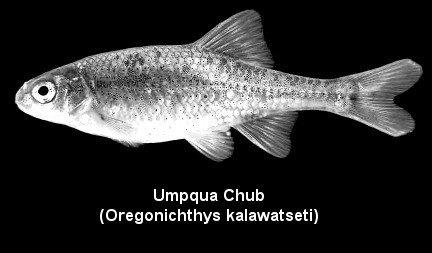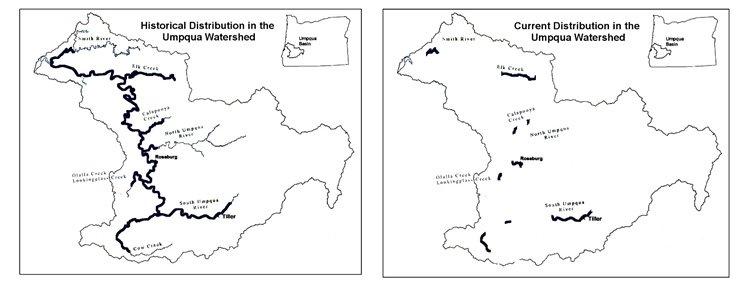Winter 2017
Stanley Petrowski
Something Fishy Going on Here
This is the first time I have written two restoration committee articles in one of the 100 Valleys newsletters. This topic is so critically important that I felt it necessitated special attention.
Recently Umpqua Watersheds held its annual strategic planning session for the Board of Directors. During that time, each Board member is asked to outline the top projects of importance for which they are focusing in the area of responsibility. As Chair of the Restoration Committee, I had three issues that demand my immediate attention. The Umpqua Chub (Oregonichthys kalawatseti) is one of them.
 Most of you who receive this newsletter are sincere and deeply concerned conservation minded naturalists and environmentalists. We are grateful for that. Most of you are also familiar with the beautiful wilds of our eco-region and want to know what issues are most in need of our attention. Protection of our wildlife, vegetation and aquatic species have long been the rallying point of our supportive members. Restoring habitat and the abundance of its beleaguered residents is the raison d’etre of the restoration committee. We face many wicked challenges here in the Umpqua watershed basin and it surrounding bio-region.
Most of you who receive this newsletter are sincere and deeply concerned conservation minded naturalists and environmentalists. We are grateful for that. Most of you are also familiar with the beautiful wilds of our eco-region and want to know what issues are most in need of our attention. Protection of our wildlife, vegetation and aquatic species have long been the rallying point of our supportive members. Restoring habitat and the abundance of its beleaguered residents is the raison d’etre of the restoration committee. We face many wicked challenges here in the Umpqua watershed basin and it surrounding bio-region.
Since the 1990’s it became apparent through the work of Douglas F. Markle and others that there was a unique chub specie found nowhere else in the world except in the Umpqua basin. It is the Umpqua Chub (Oregonichthys kalawatseti). The once Federally listed Oregon Chub has recently been delisted thanks to the strategies applied by the science, academic and restoration ecology communities. The listing of the Oregon Chub brought the Umpqua Chub to the attention of agencies and stakeholder groups. This precious little minnow is experiencing a precipitous decline in its range of distribution and its population numbers.
Comparing the two images above it is plain to see that this rare little fish is on the verge of blipping off of the radar screen of the natural world. My hope is that you will become as concerned about this tragic situation as I am. Time is of the essence.
Here’s What We Know
All of the government agencies that I am aware of understand that there is a decline of this specie. NGOs like the American Fisheries Society (AFS) and others are also watching what is going on in our basin. The Umpqua Dace and the Pike Minnow are also a matter of concern according to non-game species biologists. AFS held a work shop focusing on the Chub and other Umpqua non-game fish at an Upper South Umpqua river national forest camp ground some time back. It was a privilege to interact with knowledgeable people for the three days of that meeting.
 It was then that I engaged the regional agency folks to see if there was any way for me to support the conservation plan for the Umpqua Chub. The biggest problem facing us is a lack of data. Some surveys have been done. The map images are a product of that. If you take a map of where the Umpqua Chub are located and overlay it with a map of where the Small Mouth Bass are located they are almost a 100% positive/negative of each other.
It was then that I engaged the regional agency folks to see if there was any way for me to support the conservation plan for the Umpqua Chub. The biggest problem facing us is a lack of data. Some surveys have been done. The map images are a product of that. If you take a map of where the Umpqua Chub are located and overlay it with a map of where the Small Mouth Bass are located they are almost a 100% positive/negative of each other.
What We Need
We can’t do much for the Umpqua Chub without a clearer picture of the entire river system. We need more data! The Umpqua Basin is the largest geographical Oregon coastal ESU watershed. The strategy to date has been to survey the larger tributaries of the system and extrapolate to the entire system to determine the POTENTIAL population level. Previous surveys have been extremely useful but a survey of the entire basin needs to be conducted by an independent professional institution or contractor. So far no one has volunteered.
What Is Being Done
Six key tributaries are marked for surveys. That effort has been thwarted by the responsible agency because they are constantly being called away from their projects, year after year, to deal with forest fires. There should be a release of newer results in the not too distant future. The problem is that we need hard data rather than extrapolated numbers based on modeling.
ODFW has at long last removed the limit of bass that can be caught in the Umpqua. This has been a long hard struggle for Alan Bunce, the UW outreach coordinator. He’s seen the adverse impact of the bass for some time. As an avid snorkeler, he’s seen first-hand the voracious appetite these non-native predators have.
Here’s the problem. There are millions of bass in the Umpqua river system. On top of that, most of the serious bass fishermen I know catch and release. Yep. Your read that right. Their theory is that the big fish eat the little fish. If we catch and keep the large ones it will only cause the small ones to multiply all the more.
That’s a faulty premise as far as I am concerned. Why don’t we handle all of the noxious invasive species that way? We don’t. We aggressively seek to eliminate them. It should be the same for the bass. They need to be recognized as a noxious predatory specie and taken off the status of “Game Fish” by the State of Oregon. Until the nightmare of the bass population is addressed, we are going to be hard pressed to find a solution to our quickly diminishing native fish species. Put a bounty on the accursed fish. Kids will be catching them all summer long. Organic farmers would love to use them as fertilizer.
I would be a hard thing to do since the Bass Fishing Lobby holds a lot of sway in the State of Oregon. Some of its greatest advocates have been federal and state agency people. It’s crazy. We’ve got the proverbial fox guarding the chicken coop on that one.
How to Move Forward
As stated previously – we need a full scale survey before any real action can take place. I doubt very much if the agencies have the time or money to do it. We need concerned members to form an action group. There needs to be a clear strategy and the initiation of a campaign. Any donation to the campaign would be tax deductible through an Umpqua Watersheds 501(C) 3 non-profit status. If you are already inspired to give, specifically designate it to “Umpqua Chub” on the check or an attached note. You can send money via your PayPal account to Umpqua Watersheds with a note citing the Umpqua Chub Fund. Visit the Umpqua Watersheds website (www.umpquawatersheds.org)..
If you are not able to contribute financially – you can still help us by encouraging others to contribute to this vital work or actively building the campaign. I want to remind you that the heart and soul of Umpqua Watersheds is based on the volunteer work of Umpqua Watersheds members and especially the Board of Directors. A small fraction of all donations goes to keep the lights on at the office.
Finally, please, please, do not let this fish disappear in our days.

